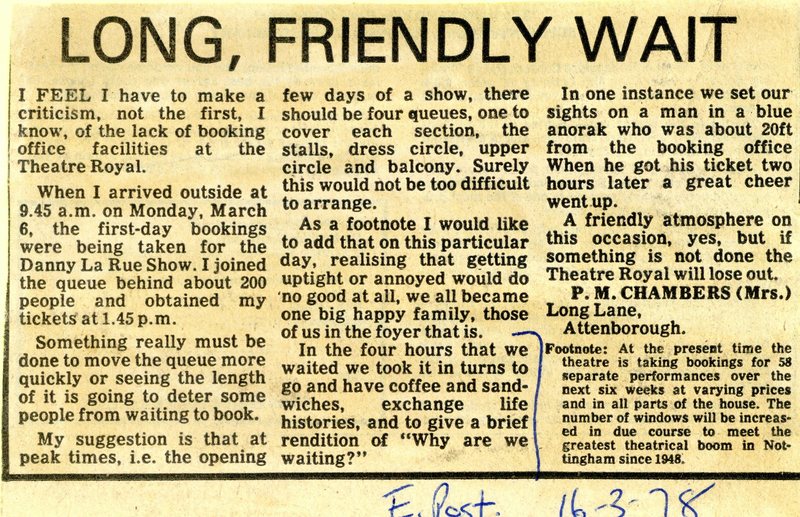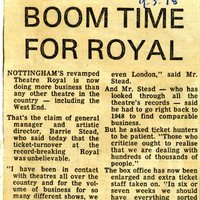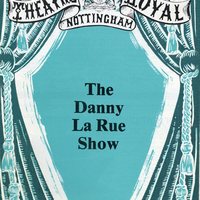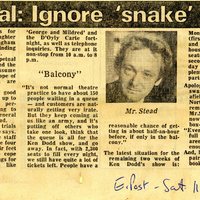Title
Theatre Re-Opening, Box Office Complaint Letter - Newspaper Cutting, 1978
Date
16 March 1978
Description
Letter sent to and printed in the Nottingham Evening Post regarding the lengthy box office queues at the recently re-opened Theatre Royal.
What's the story?
In the 1970s it was the vision of Nottingham City Council, under the leadership of Councillors Len Maynard and John Carroll, to create innovative and major changes to the Theatre Royal and its surrounding buildings.
With the idea of a Festival Hall complex, which would include a refurbished and modernised Theatre Royal, on the site of the now razed Empire Theatre on South Sherwood Street would stand a new Concert Hall.
In order to enable the Theatre Royal to accommodate new offices, dressing rooms and a large loading bay to enable large-scale work from visiting companies, it was also proposed that the Victorian built County Hotel, immediately adjacent to the Theatre Royal be purchased and demolished.
At a time of austerity in Britain, these proposals were controversial due to the large amounts of money to be spent on the project, as well as the demolition of the County Hotel, a much-loved building in the city.
These arguments spanned most of the 1970s, culminating in 1977/1978 when the Festival Hall plans were rejected, but councillors deciding to continue with the Theatre Royal modernisation, which still included the demolition of the County Hotel.
This continuing drama, worthy of the Theatre Royal stage itself, was regularly played out in the pages of the Nottingham Evening Post, the local daily paper for the city and whose offices at the time were directly opposite the proposed Concert Hall site on Forman Street.
This letter from Mrs Chambers of Attenborough was sent to the Nottingham Evening post to complain about the lengthy queues at the Box Office at the recently re-opened Theatre Royal.
The tone of her letter is quite supportive, describing “a friendly atmosphere” in the queue, but obviously a four-hour wait to purchase her Danny La Rue tickets is very lengthy.
The massive demand for tickets at the newly re-opened venue took everyone by surprise, but clearly shows the popularity of the venue.
With the idea of a Festival Hall complex, which would include a refurbished and modernised Theatre Royal, on the site of the now razed Empire Theatre on South Sherwood Street would stand a new Concert Hall.
In order to enable the Theatre Royal to accommodate new offices, dressing rooms and a large loading bay to enable large-scale work from visiting companies, it was also proposed that the Victorian built County Hotel, immediately adjacent to the Theatre Royal be purchased and demolished.
At a time of austerity in Britain, these proposals were controversial due to the large amounts of money to be spent on the project, as well as the demolition of the County Hotel, a much-loved building in the city.
These arguments spanned most of the 1970s, culminating in 1977/1978 when the Festival Hall plans were rejected, but councillors deciding to continue with the Theatre Royal modernisation, which still included the demolition of the County Hotel.
This continuing drama, worthy of the Theatre Royal stage itself, was regularly played out in the pages of the Nottingham Evening Post, the local daily paper for the city and whose offices at the time were directly opposite the proposed Concert Hall site on Forman Street.
This letter from Mrs Chambers of Attenborough was sent to the Nottingham Evening post to complain about the lengthy queues at the Box Office at the recently re-opened Theatre Royal.
The tone of her letter is quite supportive, describing “a friendly atmosphere” in the queue, but obviously a four-hour wait to purchase her Danny La Rue tickets is very lengthy.
The massive demand for tickets at the newly re-opened venue took everyone by surprise, but clearly shows the popularity of the venue.
Type
Newspaper cutting
Location of item
Theatre Royal & Royal Concert Hall Nottingham
Rights
Theatre Royal & Royal Concert Hall Nottingham
Contributor
Researcher: David Longford



